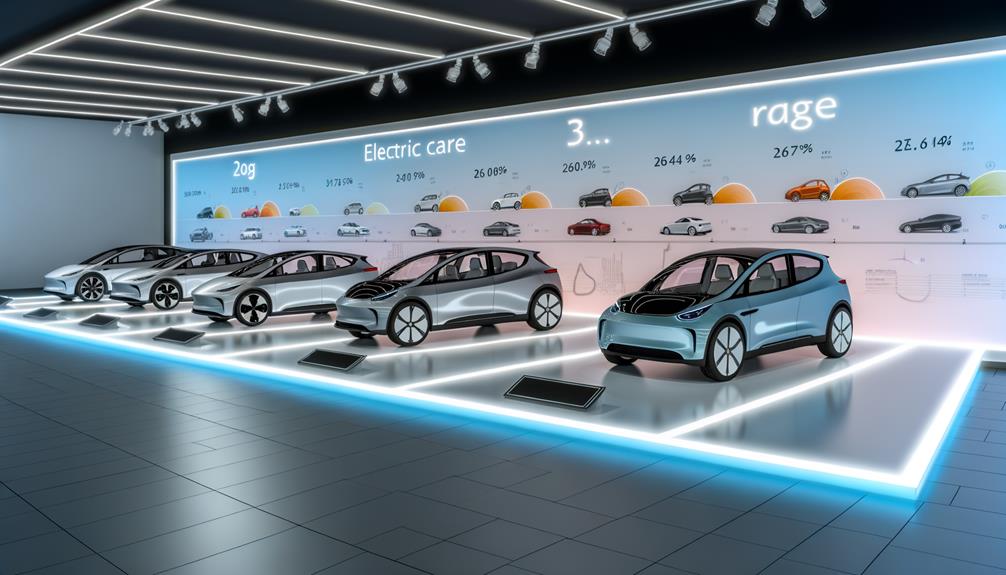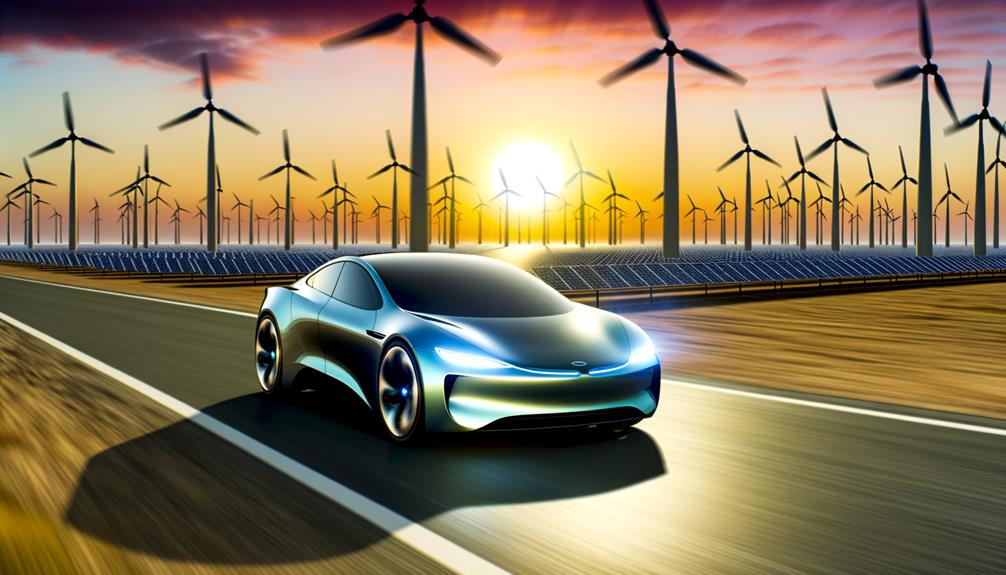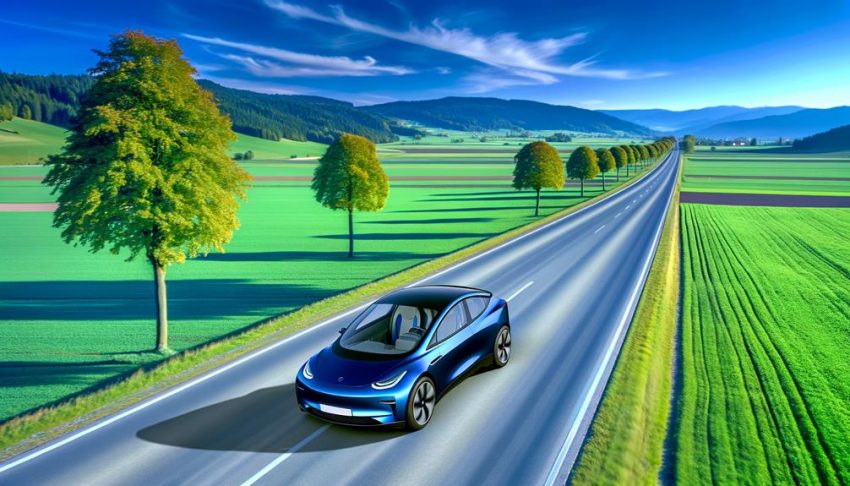When you're considering an electric car, range is likely at the forefront of your mind. Did you know that the Mercedes EQXX recently achieved a staggering test range of 627.6 miles? This sets a new benchmark in the industry, but the competition is fierce. The Lucid Air Grand Touring isn't far behind, with a range of 516 miles. These advancements are reshaping what's possible with electric vehicles. But what exactly makes these cars capable of such impressive distances? Let's explore the technology and design innovations driving this revolution.
Contents
Top Longest-Range Electric Cars
When considering the top longest-range electric cars, the Lucid Air Grand Touring stands out with an unparalleled range of up to 516 miles on a single charge. Such a maximum range sets a new benchmark in the EV industry, showcasing the capabilities of advanced battery technology and efficient design. Lucid Air's achievement not only emphasizes the potential of electric cars but also redefines consumer expectations for long-distance travel without frequent charging stops.
Next in line is the Rivian R1T, a luxury electric pickup offering a range of 410 miles. This model caters to those seeking robust performance and versatility, blending utility and comfort. The Rivian R1T's real-world range makes it a formidable option among EV models, particularly for outdoor enthusiasts and those requiring extended travel capabilities.
The Tesla Model S Long Range variant is another strong contender, boasting an impressive range of 402 miles. Known for its high performance and fast charging speeds, Tesla has consistently pushed the envelope in electric vehicle innovation. The Model S Long Range is a demonstration of Tesla's commitment to maximizing range without compromising on speed or efficiency.
The Rivian R1S, the SUV counterpart to the R1T, offers a range of 400 miles. This model provides ample space and comfort, making it an ideal choice for families looking for a practical yet long-range electric vehicle.
Lastly, the Mercedes EQS sedan delivers a range of 352 miles. Combining performance with luxury features, the EQS exemplifies how high-end electric cars can offer both long-range travel and an upscale driving experience.
Detailed Specifications and Performance
Delving into the detailed specifications and performance of these leading electric vehicles reveals the cutting-edge technology driving their impressive ranges. The Lucid Air Grand Touring stands out as the longest-range electric car, boasting an estimated 516 miles on a single charge. This achievement is attributed to its advanced 112 kWh battery pack, which maximizes energy density and efficiency, enabling you to travel long distances without frequent recharges.
Moving to the Mercedes EQS 450+, its 107.8 kWh battery allows for an estimated range of 452 miles. The EQS utilizes innovative aerodynamics and a highly efficient powertrain to guarantee that it delivers peak performance while maintaining luxury and comfort. Its large battery pack and cutting-edge technology make it a formidable competitor in the longest-range electric car segment.
The Volkswagen ID.7 Pro S variant, equipped with an 86 kWh battery, offers an impressive 437 miles on a single charge. Its spacious design doesn't compromise on efficiency, making it an excellent choice for those seeking both range and practicality. The ID.7's performance is bolstered by an efficient electric motor and advanced energy management systems.
Meanwhile, the Porsche Taycan, with the Performance Battery Plus option, achieves a maximum range of 421 miles. This electric sports car blends luxury and performance, utilizing an 83.7 kWh battery pack to deliver high-speed capabilities and long-range efficiency. It's a demonstration of how electric vehicles can meet both performance and range requirements.
Lastly, the Polestar 2 Long Range version, with a range of 406 miles, showcases significant improvements in battery technology and efficiency. Its robust powertrain and updated battery pack guarantee reliable performance, making it a strong contender in the electric vehicle market.
Pricing and Value Comparison

Examining the pricing and value of these leading electric vehicles provides a thorough understanding of what each model offers beyond their impressive ranges. When considering the longest range, it's crucial to balance the initial cost against the vehicle's features and overall value proposition.
- Lucid Air: At a base price of $78,900, the Lucid Air stands out with its market-leading range of 516 miles. This positions it as a high-value option for those prioritizing maximum range without compromising on luxury or performance.
- Tesla Model S Long Range: Priced at $76,630, the Tesla Model S Long Range delivers 394 miles of range. It represents a balanced offering, combining strong performance metrics with a relatively affordable price tag for a luxury electric car. This makes it an attractive option for those seeking both value and high-end features.
- Mercedes EQS 450+: With a range of 452 miles and a substantial base price of $105,550, the Mercedes EQS 450+ emphasizes luxury and cutting-edge technology. Its higher cost is justified by its premium features and advanced engineering, making it a prime choice for buyers who prioritize luxury and extended range.
- Volkswagen ID.7 Pro S: The ID.7 Pro S, featuring an 86kWh battery and a range of 437 miles, comes at a competitive price point. This makes it appealing to budget-conscious consumers who still want long-distance driving capabilities without the higher costs associated with more luxurious models.
Range Testing Methodology
How do you accurately determine the real-world range of an electric vehicle? The range testing methodology is critical in providing a realistic measure of how far an electric vehicle (EV) can travel on a single charge. Unlike purely relying on manufacturer specifications, real-world driving conditions are simulated to reflect everyday use. This process involves a mix of city and highway driving cycles, acceleration, deceleration, and varying speeds.
The Environmental Protection Agency (EPA) utilizes a standardized testing process that evaluates the electric vehicle range based on specific driving cycles. These tests are designed to mimic typical driving behavior, often yielding results that differ from controlled laboratory testing due to factors like temperature, terrain, and driver behavior.
| Factor | Impact on EV Range |
|---|---|
| Temperature | Affects battery efficiency |
| Terrain | Influences energy consumption |
| Driving Behavior | Alters speed and acceleration rates |
| Standardized Tests | Guarantees comparability across models |
Manufacturers also employ their own testing methods, such as the Worldwide Harmonized Light Vehicles Test Procedure (WLTP). The WLTP generally provides higher range estimates compared to EPA testing, primarily because it incorporates a broader range of driving conditions and often less stringent parameters.
In essence, the real-world driving conditions used in these methodologies offer a more accurate picture of an EV's range. Factors such as temperature, terrain, and driving behavior are meticulously considered, making the results more representative of what you can expect in daily use. This thorough approach guarantees that the electric vehicle range you see on paper closely matches what you'll experience on the road, providing a reliable basis for comparison across different models.
Future Trends in EV Range

Considering the methodologies that provide a realistic measure of an electric vehicle's range, it's evident that advancements in EV technology are on the horizon. As battery technology continues to evolve, the future of electric vehicles (EVs) looks incredibly promising. For instance, manufacturers like Toyota are gearing up to introduce models capable of exceeding 500 miles of range by 2026. This leap in battery efficiency and capacity will certainly make long-distance travel more accessible and convenient for EV owners.
Here are some key trends you should watch:
- Battery Technology: Advances will lead to higher energy density batteries, enabling electric cars to achieve greater ranges. The Lucid Air, which already boasts 516 miles of range, exemplifies the direction future EVs are heading.
- Aerodynamics: Future EV designs will prioritize aerodynamics and weight reduction. Concept vehicles like the Mercedes EQXX, which achieved a test range of 627.6 miles, highlight the significant role of streamlined design in enhancing efficiency.
- Charging Infrastructure: The expansion of fast-charging networks will alleviate range anxiety, making it easier for drivers to undertake long-distance journeys without extended downtime for charging.
- Efficiency Improvements: Innovations in drivetrain efficiency and energy recovery systems will further boost the effective range of electric vehicles, ensuring that every watt of battery power is utilized effectively.
As the EV landscape continues to evolve, expect future technology to deliver vehicles that not only match but surpass the current benchmarks set by models like the Lucid Air. These advancements will make long-distance electric travel a viable option for a broader range of consumers, ushering in a new era of sustainable transportation.
Frequently Asked Questions
What Is the Longest Range of Any Electric Vehicle?
You're curious about the longest range of any electric vehicle? The Lucid Air Grand Touring holds the record at 516 miles, thanks to advanced battery technology. Consider market trends, charging infrastructure, and future innovations when evaluating EV options.
What Electric Car Gets 500 Mile Range?
You're looking at the Lucid Air Grand Touring and Mercedes EQS 450+ for 500-mile ranges. Advancements in battery technology and charging infrastructure are reducing range anxiety, influencing market trends, consumer preferences, vehicle performance, maintenance costs, and environmental impact.
Will Electric Cars Ever Get to 1000 Mile Range?
You'll likely see 1000-mile range electric cars as battery technology improves energy density and thermal management. Aerodynamic design, vehicle weight reduction, and fast charging advancements will address range anxiety, driven by consumer demand and market competition. Charging infrastructure will evolve too.
What Electric Car Has an 800 Miles Range?
Currently, no electric car offers an 800-mile range. Advances in battery technology, charging infrastructure, and sustainable materials are essential. Future innovations and market competition will address range anxiety, aligning with consumer preferences and performance metrics. Government incentives will help too.
Conclusion
To sum up, if you're prioritizing range, the Mercedes EQXX leads with its 627.6-mile capability, followed closely by the Lucid Air Grand Touring at 516 miles. These vehicles exemplify cutting-edge advancements in battery technology and aerodynamics. When evaluating electric cars, consider not just range but also specifications, pricing, and value. As EV technology evolves, expect even greater range capabilities, further addressing consumer needs and accelerating the adoption of electric vehicles.
